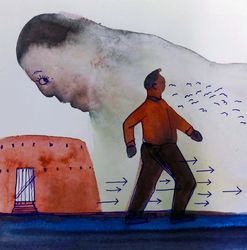In Swachh Survekshan 2020, the annual cleanliness survey of some 4,000 cities by the Central government, Buxar in Bihar found an ignominious place. It was the second dirtiest among cities with a population of less than 10 lakh. The first place went to the international pilgrim centre Gaya, also in Bihar. The state capital, Patna, was the dirtiest among cities with a population of more than 10 lakh.
Buxar, like other Bihar cities, had defied all incentives of the urban development ministry initiated by the Manmohan Singh and Narendra Modi governments. From sewage and garbage disposal to supply of clean water, the city administration’s performance was patchy on all cleanliness parameters. The chief justice of the Patna High Court, during an official visit to Buxar, saw for himself that the environs of the court complex in the city was filthy. Interestingly, he did not issue a direction to the municipal corporation, but asked local judges to arrange community services in the area, which included temples.
The oral orders, however, were reduced to writing by an administrative officer as a direction to clean just the temples. Though questions were asked, the judges and staff came on a holiday to do community service. But the district judge felt there was some mischief in the wording, as there was no direction from the chief justice to clean only the temples. An inquiry was ordered on how the cleanliness advice was narrowed down to temples only.
It is not unusual for judges to initiate community service; several high court and district judges have imposed non-penal activities, especially while considering bail applications. Judges have asked accused persons in criminal cases and recalcitrant respondents in civil matters to plant trees, clean premises, take classes in government schools or donate books.
In Madhya Pradesh, a respondent was asked to provide a water harvesting system in the opposite party’s home. Prison authorities, too, take inmates for community service, so that the time spent helps in getting parole or early release.
When it comes to fines, especially for what a court considers as frivolous litigation that wastes judicial time, the litigants are told to deposit fines with the prime minister’s or chief minister’s relief funds, and in some cases into the Advocates’ Welfare Fund. In rare cases, judges have imposed big fines on rich convicts instead of giving them long prison terms.
The police and prosecution, however, argue against this concessional approach, pointing out that the Indian Penal Code and other criminal laws do not provide alternatives to jail and fines. There have also been instances when judges suggested baffling solutions like asking a rape victim to marry the rapist.
There was an attempt in 1978 by the Janata government of Morarji Desai to amend the criminal laws so that those convicted of offences warranting short prison sentences could instead be directed to do a stretch of community service. But the government collapsed the next year, and the amendment was not taken up by subsequent governments.
The Justice Malimath Committee, which made far-reaching recommendations for reforming the criminal justice system two decades ago, had also strongly recommended alternative accountability measures to long prison terms. But this report, too, has not been implemented holistically.
Meanwhile, Buxar festers in its garbage as even judicial advice gets distorted and leads to controversies.
sachi@theweek.in


